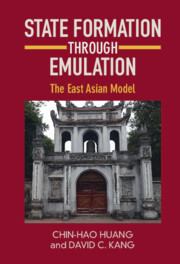Book contents
- State Formation through Emulation
- State Formation through Emulation
- Copyright page
- Epigraph
- Contents
- Preface
- 1 Introduction
- 2 Theories of State Formation and Diffusion
- 3 Phase I and Onwards
- 4 The Absence of Bellicist Pressures in State Formation, 400–800 CE
- 5 Phase II
- 6 Korea and Japan over the Centuries
- 7 Vietnam Emerges
- 8 Epistemic Communities and Regional Connections
- 9 Who Doesn’t Emulate?
- 10 Conclusion
- Appendix Major Events in Sinicization, 300–1100 CE
- Bibliography
- Index
7 - Vietnam Emerges
Tenth to Fourteenth Centuries
Published online by Cambridge University Press: 21 July 2022
- State Formation through Emulation
- State Formation through Emulation
- Copyright page
- Epigraph
- Contents
- Preface
- 1 Introduction
- 2 Theories of State Formation and Diffusion
- 3 Phase I and Onwards
- 4 The Absence of Bellicist Pressures in State Formation, 400–800 CE
- 5 Phase II
- 6 Korea and Japan over the Centuries
- 7 Vietnam Emerges
- 8 Epistemic Communities and Regional Connections
- 9 Who Doesn’t Emulate?
- 10 Conclusion
- Appendix Major Events in Sinicization, 300–1100 CE
- Bibliography
- Index
Summary
Vietnam’s experience in the tenth and eleventh centuries was remarkably similar to that of Korea and Japan. The adoption of Confucian traditions as preferred modes of governance, in particular, reflected strong state bureaucratic practices that made Vietnam stand out from its neighbors in continental Southeast Asia. By 973 the Vietnamese state had been recognized as a Song tributary, and within a century, the Vietnamese state had created centralized provinces, founded a Royal Confucian Academy, used Chinese in all its writings, implemented a national tax, and created a national military based on universal conscription. By 1075, the Vietnamese court had instituted civil service examinations based on Chinese Confucian classics. The civil service examination would be used for the next nine hundred years, and it was only the arrival of French imperialists that transformed the government. Confucianism penetrated to the level of economic and family organization at the village level, affecting patrilineal inheritance and even dress. Vietnamese retained their indigenous language for unofficial uses, and indigenous social and religious customs, chief among them Buddhism.
- Type
- Chapter
- Information
- State Formation through EmulationThe East Asian Model, pp. 134 - 154Publisher: Cambridge University PressPrint publication year: 2022

